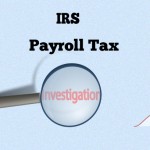Craig Thomas
Latest posts by Craig Thomas (see all)
- Chris Feels Victorious - September 8, 2016
- Are You At Risk of a Levy? - May 26, 2016
- 3 Ways To Survive Your Spouse’s Tax Troubles - February 15, 2016
Did you know that when you sign a Joint Tax Return, the IRS holds you equally responsible for all tax consequences? Even when the IRS discovers an error due to your spouse, you are also responsible for the liability.
In order to help protect a taxpayer from being forced to pay for incorrect information reported by the taxpayer’s spouse on their return, the IRS set up the Innocent Spouse Relief Program. If a taxpayer can prove that he or she is legitimately not responsible for owed tax debts stemming from the years the taxpayer was married, then the IRS may decide to collect only from the other spouse or ex-spouse.
There are 3 different forms of spouse relief, which are all described in more detail below. If a taxpayer does not qualify for one type, then it is possible that he or she may qualify for another.
1. Classic Innocent Spouse Relief
The original form of spouse relief fully relieves a taxpayer of their spouse’s tax liability, including interest and penalties. In order to qualify, the following conditions must be met:
- A joint tax return must have been filed
- The understated tax amount on the return was due to erroneous items.
- The taxpayer proves that, at the time he or she signed the joint return, the taxpayer did not know, and had no reason to know that there was incorrect information reported by the taxpayer’s spouse on the return.
- Given all of the facts, the IRS determines that it would be unfair to hold the innocent taxpayer responsible for the incorrect information reported by the taxpayer’s spouse on the return.
The key here is that the IRS must determine that you did not know, or had no reason to know about any erroneous reporting. To do so, the IRS will look at several factors, such as your educational level, your participation in your family finances, and whether or not you benefited from the under reporting.
2. Relief by Separation of Liability
Under this form of innocent spouse relief, the IRS allocates the percentage of responsibility among each spouse, instead of holding them equally liable for the entire amount. To qualify for this form of relief, the tax debt needs to have stemmed from an error, such as under reporting of income, or incorrectly calculating your tax liability. The primary qualifications are:
- You are no longer married to, or are legally separated from your spouse
- There was not an attempt to defraud
- You had no knowledge of the erroneous items at time return was filed
3. Equitable Relief
Taxpayers who do not qualify for Classic Innocent Spouse Relief, or Relief by Separation of Liability may qualify for the Equitable Relief program. This form of innocent spouse relief is the only one that will allow you to request relief from an underpayment of tax where the tax liability was listed correctly on a taxpayers return, but was not paid.
The key to qualifying for Equitable Relief is that the facts and circumstances must show that it is unfair to hold you responsible for the understated or unpaid tax bill.
For example: Your joint tax return shows you and your spouse have a $15,000 liability. Let’s say you are responsible for $7,000, and your spouse is responsible for $8,000. You pay your portion with the tax return filing. There remains an underpaid portion of $8,000.
What if you withdrew money to give to your spouse, in order for he or she to submit their portion of their tax liability? But, unbeknownst to you, your spouse spent the money elsewhere. Or, what if your spouse deserts you, and leaves you on the IRS hook for the $8,000?
As long as certain requirements are met, the IRS might find it unfair to hold a taxpayer responsible in the above scenarios.
If you find yourself in this situation, and want to take advantage of the opportunity before you, contact me, Craig Thomas, CPA & Certified Tax Resolution Specialist, at Streamline Tax Resolution to discuss the possibilities: (888) 545-5789 x201 or cthomas@streamlinetaxresolution.com.







